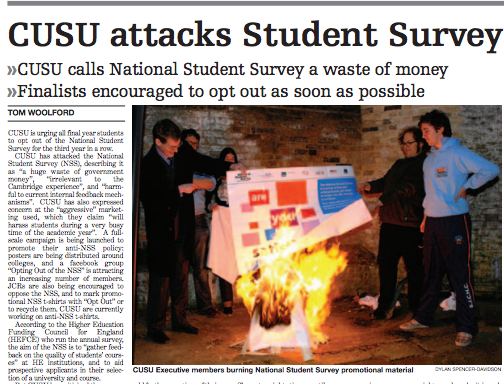The following is an opinion piece by Shelly Asquith; it is not an official statement of the Free University of Sheffield.
Last week, Times Higher Education reported that Black academics are being scored lower than their White peers in the National Student Survey (NSS). Those familiar with the context of institutionalised racism in higher education will not find these results surprising, and will recognise that it merely scratches the surface of the problem. As we approach peak NSS season, the article provides a welcome invitation to begin discussing the wider issues the survey perpetuates.
The NSS facilitates a passive analysis of ‘satisfaction’ and encourages the notion of student-as-consumer. It is aggressively marketed to final year undergraduates, with its results used to inform league tables: measuring the commodification of the university ‘experience’. With the outcomes of the Green Paper (or “HE Bill”) on the horizon, methods like NSS become even more useful to the market. As institutions with a 100% score attract more students, they are also more likely to raise their fees. As proponents of free education, we must be clear how we respond to such mechanisms.
Students and Students’ Unions have previously been very vocal in our criticism of NSS, but in recent years it has been deprioritised as an issue. This is partly due to the movement having to respond to a swathe of fundamental reforms: higher fees, budget cuts, as well as a focus from the Left towards pay disputes and other workers’ struggles. It is also, importantly, due to our own internalisation of the market. NUS, students’ unions and student reps are encouraged to promote and indulge in its outcomes, sometimes even being financially rewarded for doing so. Institutions sell these anonymous, bureaucratic feedback methods to us as empowering and democratic; and in the absence of a genuine, mass movement it is easy to fall for it. We have quickly forgotten that the NSS is an indirect cause of the issues we have been diverted towards, and allowed it to demobilise our resistance to them. We are, unwittingly, pushing the agenda of the Vice Chancellors who lobby for the fee rise we so fervently oppose.
UCU, the lecturers’ trade union, has long criticised NSS, describing it as ‘measuring cost effectiveness rather than the real value of educational experience.’ Instead of meaningfully questioning how transformative our time at university was, we are encouraged to question whether the £9k (or more) price tag was worth the money. We rate our product out of 5 at the end of 3 years, as if it were an app. In fact, in its promotion, the NSS even boasts that it can be filled in quickly on a smartphone.
UCU also criticise the impact this has on the workforce, creating a culture of fear and pitting students against staff. It has long been noted that university managers will point to low NSS scores as a reason to discipline and dismiss, cut back and close courses. Low satisfaction caused by management failings will be blamed on front line, low paid academics. Terrified staff have been consistently reported to have written stock answers, watched students as they fill it in, or threatened of reputational damage to a course if a score falls.
A lot of resources go in to NSS. Large sums of money are spent on encouraging students to complete it; or on making small, cosmetic changes in response to feedback. In the hope that high turnouts will boost results, institutions will go to any lengths to achieve it. Our opinions are bought, as we are offered freebies, iPads and other perks in order to get favourable feedback. Committees are formed to plan our entire NSS strategies, with budgets assigned for changes to be made in order to influence results. Have you noticed that universities will announce new library opening hours at this time of year? It’s no coincidence that it’s NSS o’clock! Departments splash out on new equipment, and so it tends to be the institution’s finances that dictate the survey results year on year: the rich, White academies come out top.
This is not to say that improvements in response to feedback is negative – far from it – but it is a cynical model standing in the way of real, democratic involvement of students in their education system. For the duration of a three or four year course, the one time management will take note of a matter is weeks before you graduate. To make us feel empowered by the process though, NSS have started to co-opt symbols of activism, using megaphones and placards in its promotion.
There are so many other ways we could capture student opinion and measure excellence in academia. For instance, investing in course representatives and students’ unions, or encouraging dialogue between students and staff. A move from merely ‘satisfaction’ towards assessing how supportive students found the mental health services; or how safe, included and welcomed they felt in their institution. Meaningful engagement comes from adapting to our circumstances; not adopting a one size fits all approach. The survey makes no allowance for the fact that students’ academic, assessment and access needs differ according to their learning environment. Our diverse institutions and pedagogies are being forced to standardise as NSS attempts to compare what should be celebrated as incomparable.
Long term, the strategy for overhauling NSS must be a mass opt-out. We are not currently at a point where consciousness of the critique can achieve this. To most, the NSS exists, and that’s that. To some, it has managed to actually convince that its usefulness in providing a snapshot of opinion outweighs the fundamental flaws and outcomes. There is a long way to in convincing the wider movement that the survey is 5/5 unsatisfactory and to “definitely agree” it needs overhauling. We must avoid small, localised opt-out protests. These would only result in clusters of low scores that would at best be dismissed by management as an anomaly – at worst, be used to root out staff. In the immediate term, the activist Left needs to work out a response to NSS – and proposed replacement – before it’s too late.




